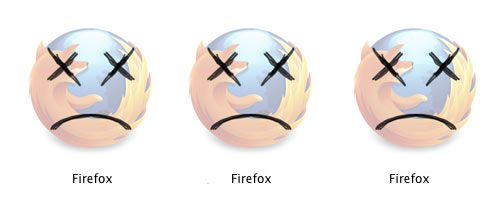In our last post, Mozilla Firefox vs. the World, I mentioned that we’d look at the reasons people had for switching away from Firefox. I posed the question on Twitter, which also flows through Facebook. If anyone listed has issue with me reposting your words, let me know and I’ll remove them.
That said, here’s what people told me. I should note that I consider most (but not all) of these people pretty technologically savvy. Most know their way around web development or programming to some degree. None of them are Aunt Tillie.

John Bailey
I switched from Firefox to Chrome. I just couldn’t stand how much slower firefox got with every update. As well as using like 500+MB memory. Chrome is much snappier. Uses less RAM. Each tab is a separately killable process. So no screwy Javascript in a tab can crash the browser.
Samantha Hawley
I gave up Firefox for Google Chrome. For some reason my Firefox would take a long time to load. Once I downloaded Chrome I noticed it was faster. I don’t know why.
Tom Henrich
I dropped Firefox for Chrome months ago. Chrome is lightning fast compared to the bloat of Firefox, even when you have dozens of tabs open. I still use Firefox at work simply because it’s got more developer-related extensions for debugging (and the Firefox versions work… better), but at home it’s nothing but Chrome. I didn’t even bother installing Firefox when I got a new computer. Just wasn’t worth the hassle.
Dossy Shiobara
Speed, mostly. Firefox has gotten sluggish in 3.x, and the only add-ons I had were Firebug and Greasemonkey. I used to miss Firebug’s Net panel once in a while, but Charles.app is 10x more useful and works for any HTTP client – so I don’t miss it any more. WebKit inspector has proven to be a more than adequate replacement for Firebug, too.
Gary Kramlich
Chrome/Chromium until something faster with better integration (good luck) comes out.
Greg Tarnoff
Chrome for speed when I am surfing. Still use Firefox for dev though.
bEx_x3d
Rarely use Firefox now, it’s painful when i do. Poorly rendered embedded fonts/CSS3 elements, my comp go freezepop, ugly interface.
EtherCycle Design
We dumped Firefox for Chrome in our office 7 weeks ago. Separate tab processes. Native Greasemonkey support. Better search integration. Better Javascript performance. Extensions dont crash.
Paul Conigliaro
I’ve moved on to Safari. I use OS X & wanted a more integrated browser. Services are what pushed me to Safari. And there seemed to be less lag. I also do some development and Safari actually has a really good feature set once enabled. Plus webkit is just fun to play with. Plus I got tired of the upgrade cycle. It’s a browser, I don’t want to beta test it. I just want it to be stable.
M. Kelley
I ditched Firefox and use Chrome on Linux/Mac/Windows. It has less bloat than Firefox. Much faster than any of the Mozilla browsers. I do web dev on there.
Chris Jaure
I gave up Firefox for daily browsing, but it’s still my primary development browser. I use Chrome for browsing. I’d switch back if Firefox were faster and had a single search/address bar. And websockets. Websockets didn’t appear to be working in the Firefox beta (with our existing app, not sure if the API is the same).
Vic Wu
I gave up Firefox for Chrome. I just browse. Firefox was giving me login issues with a handful of sites even with saved cookies. I was unable to get a fix for it.
Andy Kant
I switched from Firefox to Safari for general browsing, still use Firefox as my primary debugger though.
senvara
I went back to IE from Firefox about two years ago.
Philip Crawford
I’ve given up Firefox multiple times for Safari, but I keep going back. I mainly prefer Firefox for dev tools, but it’s a memory hog.
Thanks everyone…. There are some great responses in there. A lot of what people seemed to be saying was that Firefox wasn’t as fast as whatever other browser they are using now. (Chrome seemed to be in the lead over Safari, and I’m still not sure that IE comment wasn’t a joke.)
The one area where Firefox seemed to have an edge was with web development tools/add-ons. This has definitely been one of the reasons I’ve stuck with Firefox over the years, as I’ve found an environment that works for me in Firefox, and it didn’t matter if I was using Mac OS X, Windows, or Linux… Firefox (or Iceweasel) worked pretty much the same on each, providing a similar experience and similar tools.
Feel free to leave a comment explaining why you left Firefox for some other browser.
I know, I still didn’t get into why alternatives to Firefox may not be as good as you think they are, but I will… This post on reasons people switched should hold you over for now.
See Also: Cheap Thrills, Speed Kills… and Mozilla Firefox vs. the World.






